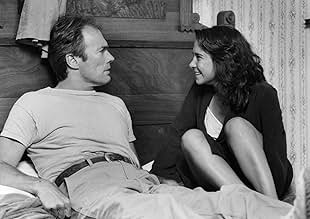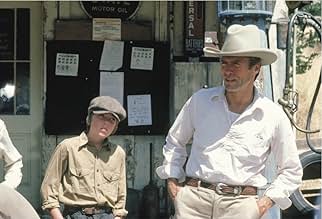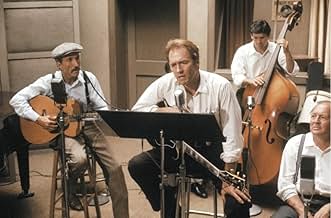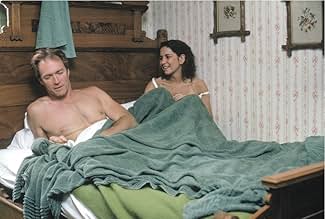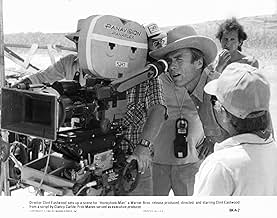IMDb-BEWERTUNG
6,6/10
9935
IHRE BEWERTUNG
Red Stovall, verlebt und todkrank, glaubt an seine große Chance. Eines Morgens tritt er fluchtartig eine abenteuerliche Fahrt durch die USA an. Vor Augen nur ein Ziel: den großen Erfolg.Red Stovall, verlebt und todkrank, glaubt an seine große Chance. Eines Morgens tritt er fluchtartig eine abenteuerliche Fahrt durch die USA an. Vor Augen nur ein Ziel: den großen Erfolg.Red Stovall, verlebt und todkrank, glaubt an seine große Chance. Eines Morgens tritt er fluchtartig eine abenteuerliche Fahrt durch die USA an. Vor Augen nur ein Ziel: den großen Erfolg.
- Auszeichnungen
- 1 Nominierung insgesamt
Empfohlene Bewertungen
A little farm somewhere in Oklahoma that can be mistaken for a Western homestead. But then a red convertible comes toward as uninvited a guest as the dust storm. Then from the worn-out overalls and the whole sandy texture, we can tell this is the Great Depression. So just before the story starts, a series of vignettes popped in my mind: families, nostalgia, America, country music, blues, road movies...I knew what to expect.
The car stops before it hurts someone (except for the driver and an ill-placed windmill), the driver isn't dead but "dead drunk", it's the family's uncle from Mama's side. He doesn't know it yet but the life of fourteen-year old Whit (Kyle Eastwood) is taking a new turn very soon. That boy spent his life staring at the emptiness of the Oklahoman plains while sitting on the house steps, so he welcomes the visitor as good news and what is hidden in the car's trunk is more than promising: it's a guitar, smooth and shiny.
As Red Stovall, Clint Eastwood makes an interesting variation on the 'cool uncle' figure, the one who travels a lot, tells interesting stories and always bring items that cut through the daily banality. Eastwood doesn't even make him unlikable, just a bit gruff, but this is a man who likes music and can only appreciate that a kid likes it. Whit's father (Matt Clark) is a frustrated farmer with the look of someone who kept eating the sour grapes of wrath, Red can see that this is no inspiring figure for a kid at the verge of adulthood while Whit admires his detachment and his badass stetson. The bond is tacit but immediate, Whit cleans his uncle's car so good one could see his face there, he makes it ready for a new start as if he felt he would be part of it.
Road movies and Great Depressions form an inevitable narrative pairing, that was the time of John Steinbeck and famers emigrating, the time Bonnie and Clyde filled the headlines while emptying small town banks, the time artists translated their ordeals into songs that built up to country music, and that's Red's dream: a stage concert in the Grand Ole Opry in Nashville. The mother (Verma Bloom) is worried about her brother's suspect coughs and accepts to have his son following him. The third passenger is Grandpa (John McIntre) who wants to go back to Tennessee, being the one instance of a man moving toward a brighter death.
As usual, Eastwood plays a man with a secret past, once we suspect triggered his alcoholism and choice for celibacy, a broken romance, a bad choice, a fear of success, who knows? There's obviously something buried in that soul that the gentle poetry of country music can dig out one shovelful at once. Like I said in many reviews, country music is all about telling stories. The film's gone for one hour when Red unveils his secrets and once they come, we're not even surprised for they were already hinted in the songs he played in shabby motels, musical clubs and honkytonks. The songs told his story allowing the rest to be totally devoted to a tender picturesque uncle-and-nephew journey.
And so we see them traveling, making halts in colorful little towns, fixing their cars and visiting whorehouses to pursue the initiation of little Whit, he breaks a promise by drinking some bootleg whisky, he has his first dizzying inhalations but nevertheless remains a good kid, being as essential a driver and assistant to Red as Red is a mentor. What they have in common than is that they're aware of their limitations but are willing to take chances, still better than working in a plantation. They're right on the long term because country music doesn't nourish people as folks do but we do remember folks through country music. The audition is Red's ticket for immortality.
Now, "The Honkytonk Man" is one of these low-key Eastwood movies that only invite you to take each moment as it comes and see where it's leading up to. You have a few chuckles when they steal hens and get arrested, you're in awe of the grandpa recalling his memories of the Oklahoma rush, September 16 1893 I remember it, and you just enjoy the music. And what do you know, at the end you realize that you've enjoyed a little gem, it had a story, it had character development and once again with Clint Eastwood, even the 'minor' offerings have major things to say. This time, it's about the roots of America, the art form it originated without any European inspiration, the best that could come from the most difficult times.
The atmosphere of the era is well-restored, there are some cameos from real artists and overall, the material adapted from Clancy Carlile's novel doesn't go for the big dramatic twist. Just when you expect a deadly confrontation with a shady debtor might end bad, it's played for laughs and introduces a plucky wannabe musician named Marlene (Alexa Kenin) who also wants to make it big in Nashville, she's not a love interest, not a sidekick, but just a girl eager to get one chance to change her life, she's as willing as the others. I was really impressed by her comedic potential, making Kyle Eastwood a little bland in comparison. It's quite sad the actress passed away shortly after the film.
I don't use "low-key" as a synonym of "unpretentious", Clint Eastwood is a child of the Great Depression, if he wasn't exactly from a poverty-stricken family, he grew up with the spectacle of Okies coming to pick oranges or cotton in California and listening to radio and country music. I'm no musical expert but I could feel the passion in his songs, and from the simple but poignant way he tells his story, you can tell Eastwood had it in him. How ironic that one of his lesser known film might be his most personal.
The car stops before it hurts someone (except for the driver and an ill-placed windmill), the driver isn't dead but "dead drunk", it's the family's uncle from Mama's side. He doesn't know it yet but the life of fourteen-year old Whit (Kyle Eastwood) is taking a new turn very soon. That boy spent his life staring at the emptiness of the Oklahoman plains while sitting on the house steps, so he welcomes the visitor as good news and what is hidden in the car's trunk is more than promising: it's a guitar, smooth and shiny.
As Red Stovall, Clint Eastwood makes an interesting variation on the 'cool uncle' figure, the one who travels a lot, tells interesting stories and always bring items that cut through the daily banality. Eastwood doesn't even make him unlikable, just a bit gruff, but this is a man who likes music and can only appreciate that a kid likes it. Whit's father (Matt Clark) is a frustrated farmer with the look of someone who kept eating the sour grapes of wrath, Red can see that this is no inspiring figure for a kid at the verge of adulthood while Whit admires his detachment and his badass stetson. The bond is tacit but immediate, Whit cleans his uncle's car so good one could see his face there, he makes it ready for a new start as if he felt he would be part of it.
Road movies and Great Depressions form an inevitable narrative pairing, that was the time of John Steinbeck and famers emigrating, the time Bonnie and Clyde filled the headlines while emptying small town banks, the time artists translated their ordeals into songs that built up to country music, and that's Red's dream: a stage concert in the Grand Ole Opry in Nashville. The mother (Verma Bloom) is worried about her brother's suspect coughs and accepts to have his son following him. The third passenger is Grandpa (John McIntre) who wants to go back to Tennessee, being the one instance of a man moving toward a brighter death.
As usual, Eastwood plays a man with a secret past, once we suspect triggered his alcoholism and choice for celibacy, a broken romance, a bad choice, a fear of success, who knows? There's obviously something buried in that soul that the gentle poetry of country music can dig out one shovelful at once. Like I said in many reviews, country music is all about telling stories. The film's gone for one hour when Red unveils his secrets and once they come, we're not even surprised for they were already hinted in the songs he played in shabby motels, musical clubs and honkytonks. The songs told his story allowing the rest to be totally devoted to a tender picturesque uncle-and-nephew journey.
And so we see them traveling, making halts in colorful little towns, fixing their cars and visiting whorehouses to pursue the initiation of little Whit, he breaks a promise by drinking some bootleg whisky, he has his first dizzying inhalations but nevertheless remains a good kid, being as essential a driver and assistant to Red as Red is a mentor. What they have in common than is that they're aware of their limitations but are willing to take chances, still better than working in a plantation. They're right on the long term because country music doesn't nourish people as folks do but we do remember folks through country music. The audition is Red's ticket for immortality.
Now, "The Honkytonk Man" is one of these low-key Eastwood movies that only invite you to take each moment as it comes and see where it's leading up to. You have a few chuckles when they steal hens and get arrested, you're in awe of the grandpa recalling his memories of the Oklahoma rush, September 16 1893 I remember it, and you just enjoy the music. And what do you know, at the end you realize that you've enjoyed a little gem, it had a story, it had character development and once again with Clint Eastwood, even the 'minor' offerings have major things to say. This time, it's about the roots of America, the art form it originated without any European inspiration, the best that could come from the most difficult times.
The atmosphere of the era is well-restored, there are some cameos from real artists and overall, the material adapted from Clancy Carlile's novel doesn't go for the big dramatic twist. Just when you expect a deadly confrontation with a shady debtor might end bad, it's played for laughs and introduces a plucky wannabe musician named Marlene (Alexa Kenin) who also wants to make it big in Nashville, she's not a love interest, not a sidekick, but just a girl eager to get one chance to change her life, she's as willing as the others. I was really impressed by her comedic potential, making Kyle Eastwood a little bland in comparison. It's quite sad the actress passed away shortly after the film.
I don't use "low-key" as a synonym of "unpretentious", Clint Eastwood is a child of the Great Depression, if he wasn't exactly from a poverty-stricken family, he grew up with the spectacle of Okies coming to pick oranges or cotton in California and listening to radio and country music. I'm no musical expert but I could feel the passion in his songs, and from the simple but poignant way he tells his story, you can tell Eastwood had it in him. How ironic that one of his lesser known film might be his most personal.
Set in Depression era Oklahoma, this film tells the story of a dirt poor, alcoholic singer named Red Stovall (Clint Eastwood), who heads out for Nashville, in hopes of making it big as a country singer. The story begins on a dilapidated farm composed mostly of dust, where Red's sister hesitatingly allows her son Whit (Kyle Eastwood) to go with Red to Nashville. The kid's Grandpa (John McIntire) also wants to go, to return to his native Tennessee. The film's beginning is dreary and depressing, but wonderfully realistic of the dust bowl days of the 1930s.
Much of the plot takes place on the road, as the three travelers encounter an assortment of characters and problems along the way. The most important character they meet is a young girl named Marlene (the late Alexa Kenin), who yearns to be a country singer. It's one of many plot contrivances, but at least this contrivance offers some humor, especially when Marlene ... "sings". Other plot contrivances include a jailbreak, an angry bull, an aborted robbery, and an incident involving a chicken coop.
If the film's weakness is excess contrivances, the film's strength is the portrayal of Red as an interestingly complex character. He coughs a lot, a symptom of tuberculosis. And the TB is getting worse. The question is ... will Red be able to reach the promise land before the disease affects his ability to sing? And, in a long monologue aimed at Whit, Red talks about his long-ago love affair with Mary Sims.
The film's acting is credible, if not outstanding. Kyle Eastwood does a nice job as Whit. The film also features cameos by several then-current country singers. At the end, there's some sad real-life irony as Marty Robbins helps Red.
"Honkytonk Man" has some good atmosphere. Arguably, the best segment is at the Top Hat Club on Beale Street in Memphis, where the great Linda Hopkins belts out a blues number. If the film's writer had ditched some of those hokey "on the road" contrivances, and focused the plot more in smoky old bar rooms with low light levels and mournful music, the film would have been a lot better. As is, "Honkytonk Man" is still worth a look, if for no other reason than to see a low-key character study, in contrast to the brash and gaudy big ticket films of that cinematic era, like "Raiders Of The Lost Ark" and "Star Wars".
Much of the plot takes place on the road, as the three travelers encounter an assortment of characters and problems along the way. The most important character they meet is a young girl named Marlene (the late Alexa Kenin), who yearns to be a country singer. It's one of many plot contrivances, but at least this contrivance offers some humor, especially when Marlene ... "sings". Other plot contrivances include a jailbreak, an angry bull, an aborted robbery, and an incident involving a chicken coop.
If the film's weakness is excess contrivances, the film's strength is the portrayal of Red as an interestingly complex character. He coughs a lot, a symptom of tuberculosis. And the TB is getting worse. The question is ... will Red be able to reach the promise land before the disease affects his ability to sing? And, in a long monologue aimed at Whit, Red talks about his long-ago love affair with Mary Sims.
The film's acting is credible, if not outstanding. Kyle Eastwood does a nice job as Whit. The film also features cameos by several then-current country singers. At the end, there's some sad real-life irony as Marty Robbins helps Red.
"Honkytonk Man" has some good atmosphere. Arguably, the best segment is at the Top Hat Club on Beale Street in Memphis, where the great Linda Hopkins belts out a blues number. If the film's writer had ditched some of those hokey "on the road" contrivances, and focused the plot more in smoky old bar rooms with low light levels and mournful music, the film would have been a lot better. As is, "Honkytonk Man" is still worth a look, if for no other reason than to see a low-key character study, in contrast to the brash and gaudy big ticket films of that cinematic era, like "Raiders Of The Lost Ark" and "Star Wars".
This film is one of Eastwood´s most compelling and strikes you right at the heart. It tells us a story with such a warmth and compassion about a theme as old as America itself. It is about a man and his love for his nephew, his music and his his desire to make a name for himself before his TB´ll end it all. Though Clint´s voice isn´t the best it does however strengthen our understanding of the motivation of a man that is running against time in a setting that is both harsh and unforgiving. The movie´s depiction of the depression is outstanding and the songs are stupendous. Watch for Marty Robbins who also sings half the theme song. All in all an outstanding movie that will stay in your heart for a long, long time...
The critics didn't like this film, but I beg to differ. Perhaps I'm naive and gullible, but to me it rings true in its local color and the coping of poor people in the Depression amidst the aspirations of young and old alike.
My father, a published author in a small way, once mused to me that if he were to write a novel, it would be about someone trying to come to terms with his own mediocrity. Such is the theme of this movie, and hardly typical a consideration it is in a time when the media bombard us coast to coast, for our adulation, with the glamorous images of a mere handful of individuals who happen to have landed vast fame and fortune. What does any of this have to do with most of us? On the one hand, we live day to day. On the other, a recurring dream whispers "maybe..."
Knowing that he is living on borrowed time, Red, humble and hand-to-mouth but respected more than he knows by a few somewhat more successful colleagues (and an unusually fallible and vulnerable character for Eastwood, which he plays well) is granted, in extremis, an apparent opportunity to reach for the stars. More down-to-earth, he is also fortuitously blessed/burdened with not just one but two young proteges: first his nephew, then also a girl at loose ends. Perhaps neither is particularly talented; nevertheless both have a claim on his attention which he reluctantly fulfills in his own unassuming way, while making no exalted pretenses as to their prospects. When on his deathbed he can do no more for them, he commends them to each other. "You take care of her, now" he rasps to Whit. "She's okay. Help her with her singing." While they may never reach celebrity, the texture of life can sustain them if they face it together.
As, dying and perhaps delirious, he gazes up into Marlene's face, he sees the "raw-boned Okie woman" he had loved for several years as a mistress, and whom he later had regretted leaving. She had borne a girl whom he had never met. Marlene was a fatherless waif of about the right age. Did he recognize at the last moment his long-lost daughter? It is a question which the film leaves hanging in the air. Does genealogy matter? In practical terms, that is what she became almost too late.
For my money, it's a raw-boned, American Okie "La Boheme."
My father, a published author in a small way, once mused to me that if he were to write a novel, it would be about someone trying to come to terms with his own mediocrity. Such is the theme of this movie, and hardly typical a consideration it is in a time when the media bombard us coast to coast, for our adulation, with the glamorous images of a mere handful of individuals who happen to have landed vast fame and fortune. What does any of this have to do with most of us? On the one hand, we live day to day. On the other, a recurring dream whispers "maybe..."
Knowing that he is living on borrowed time, Red, humble and hand-to-mouth but respected more than he knows by a few somewhat more successful colleagues (and an unusually fallible and vulnerable character for Eastwood, which he plays well) is granted, in extremis, an apparent opportunity to reach for the stars. More down-to-earth, he is also fortuitously blessed/burdened with not just one but two young proteges: first his nephew, then also a girl at loose ends. Perhaps neither is particularly talented; nevertheless both have a claim on his attention which he reluctantly fulfills in his own unassuming way, while making no exalted pretenses as to their prospects. When on his deathbed he can do no more for them, he commends them to each other. "You take care of her, now" he rasps to Whit. "She's okay. Help her with her singing." While they may never reach celebrity, the texture of life can sustain them if they face it together.
As, dying and perhaps delirious, he gazes up into Marlene's face, he sees the "raw-boned Okie woman" he had loved for several years as a mistress, and whom he later had regretted leaving. She had borne a girl whom he had never met. Marlene was a fatherless waif of about the right age. Did he recognize at the last moment his long-lost daughter? It is a question which the film leaves hanging in the air. Does genealogy matter? In practical terms, that is what she became almost too late.
For my money, it's a raw-boned, American Okie "La Boheme."
Despite almost every critic I've read, I think this is a real gem by Clint Eastwood. A honest, sensitive effort in the road movie tradition. The minor tone, the naive sequences soothe Red Stovall's journey to his fate. The movie also displays a touching view of the depression era in USA. Like animated Roy Emerson Stryker's pictures the photography is remarkable as well as the sound track. I've learned about lots of singers and musicians that recorded only to give a final testimony of their art. I guess stories like these deserved a movie like Honkytonk Man. Long life to Clint, one of the most underrated talents not only in Hollywood but in the rest of the world.
Wusstest du schon
- WissenswertesThe script originally called for Whit (Kyle Eastwood) to get high from smoking marijuana, but Clint Eastwood, who is very anti-drug, refused, even with Kyle using a prop cigarette. Eastwood finally relented to his son's character getting high from a contact buzz.
- PatzerRyman Auditorium is used as the setting for the Opry. This venue was not used until the 1940s, and the movie takes place in the 1930s.
- Alternative VersionenABC edited 7 minutes from this film for its 1986 network television premiere.
- VerbindungenFeatured in At the Movies: Dueling Critics (1983)
- SoundtracksHonkytonk Man
Sung by Marty Robbins and Clint Eastwood
Top-Auswahl
Melde dich zum Bewerten an und greife auf die Watchlist für personalisierte Empfehlungen zu.
- How long is Honkytonk Man?Powered by Alexa
Details
- Erscheinungsdatum
- Herkunftsland
- Sprache
- Auch bekannt als
- El aventurero de medianoche
- Drehorte
- Fallon, Nevada, USA(scene with bull)
- Produktionsfirma
- Weitere beteiligte Unternehmen bei IMDbPro anzeigen
Box Office
- Budget
- 2.000.000 $ (geschätzt)
- Bruttoertrag in den USA und Kanada
- 4.484.991 $
- Eröffnungswochenende in den USA und in Kanada
- 667.727 $
- 19. Dez. 1982
- Weltweiter Bruttoertrag
- 4.484.991 $
Zu dieser Seite beitragen
Bearbeitung vorschlagen oder fehlenden Inhalt hinzufügen



